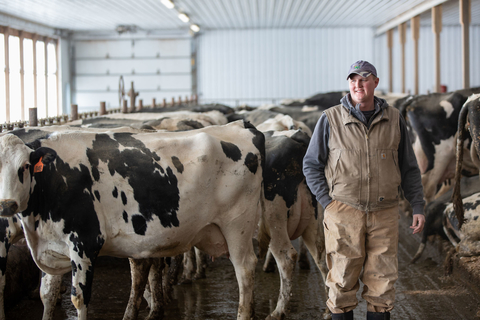Quick facts
- Recognize behavioral signs of stress like worrying, poor concentration, isolation and negative talking.
- Look for physical signs including poor sleep, weight loss or gain and poor hygiene.
- Watch for signs in yourself or others and talk to someone you trust.
- The Farm and Rural Helpline is confidential and available anytime for free when you need someone to talk to that will understand your situation.
Farming and working in agriculture can be stressful. There are many factors outside of our control, and with the state of the agricultural economy, it can be easy to feel overwhelmed and even helpless at times.
It's important to recognize when we aren’t feeling like ourselves, and to seek help if we need it.
Sometimes, we may need to help others recognize when they aren’t at their best. Understanding and recognizing the signs of stress can help.
Farm safety and personal health go together. The ability to stay safe impacts health; the ability to stay healthy impacts safety.
The relationship between stress and safety can play out in strained personal relationships, making mistakes in business or farm processes or even by causing farm accidents. When farm safety has been compromised and an accident happens, it can increase the stress of everyone involved. The impact of an accidents goes far beyond a physical injury.
Signs of stress
Though there are other categories of stress, in terms of farm safety, pay close attention to the cognitive signs of stress. Cognitive signs of stress demonstrate that our brain is overwhelmed by the amount of the stress hormone cortisol.
Cognitive signs of stress
- Confusion or forgetfulness.
- Memory loss.
- Lack of concentration.
- Difficulty making simple decisions.
- Being easily overwhelmed by tasks.
Behavioral signs of stress
- Worrying about things you didn’t worry about before.
- Loss of interest in things you used to enjoy.
- Relationship problems.
- Feeling sad or anxious.
- Change in personality and irritability.
- Negative thinking.
- Isolating yourself from people or activities.
- Increased use of alcohol, tobacco and/or drugs.
Physical signs of stress
- Poor or disturbed sleep.
- Weight loss or gain.
- Changes in appetite.
- Stomach or gastrointestinal problems.
- Clenching or grinding teeth.
- Chest pain.
- Poor hygiene.
- Frequent sickness.
Preventing farm accidents
Where stress and safety connect is in the prevention of farm accidents. Farmers are the first line of defense against accidents when they are honest about their own stress levels.
People who have been injured in a farm accident often cite things like “being tired” and “not being focused” when their accident occurred.
Take a break
We are all familiar with phrases like, “pull yourself up by your bootstraps” and “just get on with it.” Those kinds of thoughts can be overwhelming and can make any of us feel like a quitter if we stop and give ourselves a break.
We are probably all guilty of bragging about long workdays, skipping meals, or getting very little, if any, sleep. We have learned to value these things and wear them like badges of honor.
There is no award for who suffers the most. By not taking care of yourself, you can put yourself and others in danger. When you are barely sleeping, barely eating, and putting in 18 hour days, your health is jeopardized, both physically and mentally. When you are under too much stress you may not notice that you're making mistakes or missing things.
Taking a break and finding ways to relieve stress are signs that you are minding your own health and well-being. When you take care of yourself, you signal that you value the safety of everyone on your farm.
Handling stress
If you’re experiencing immense stress yourself, you can reach out to a loved one, talk about how you’re feeling to your friends, clergy, or a medical provider, or reach out to a mental health professional.
If you see these warning signs in someone else:
- Listen attentively and without judgment and try to understand where they are coming from.
- Share your concerns about their behavior, mood, appearance, etc. and ask questions about the changes you observe.
- Encourage them to reach out to someone or tell a family member.
Help is available
If you or someone you know wants to talk to someone but feels uncomfortable reaching out to family or friends, the Farm and Rural Helpline is free, confidential and available 24/7 at 833-600-2670. You can also text FARMSTRESS to 898211 or email farmstress@state.mn.us.
In times of high stress, it’s important for the farming community to come together to help one another. Don’t be afraid to speak up if you are concerned about a family member, friend or neighbor.
If you don’t feel like yourself, it’s okay. Help is available.
Reviewed in 2021


